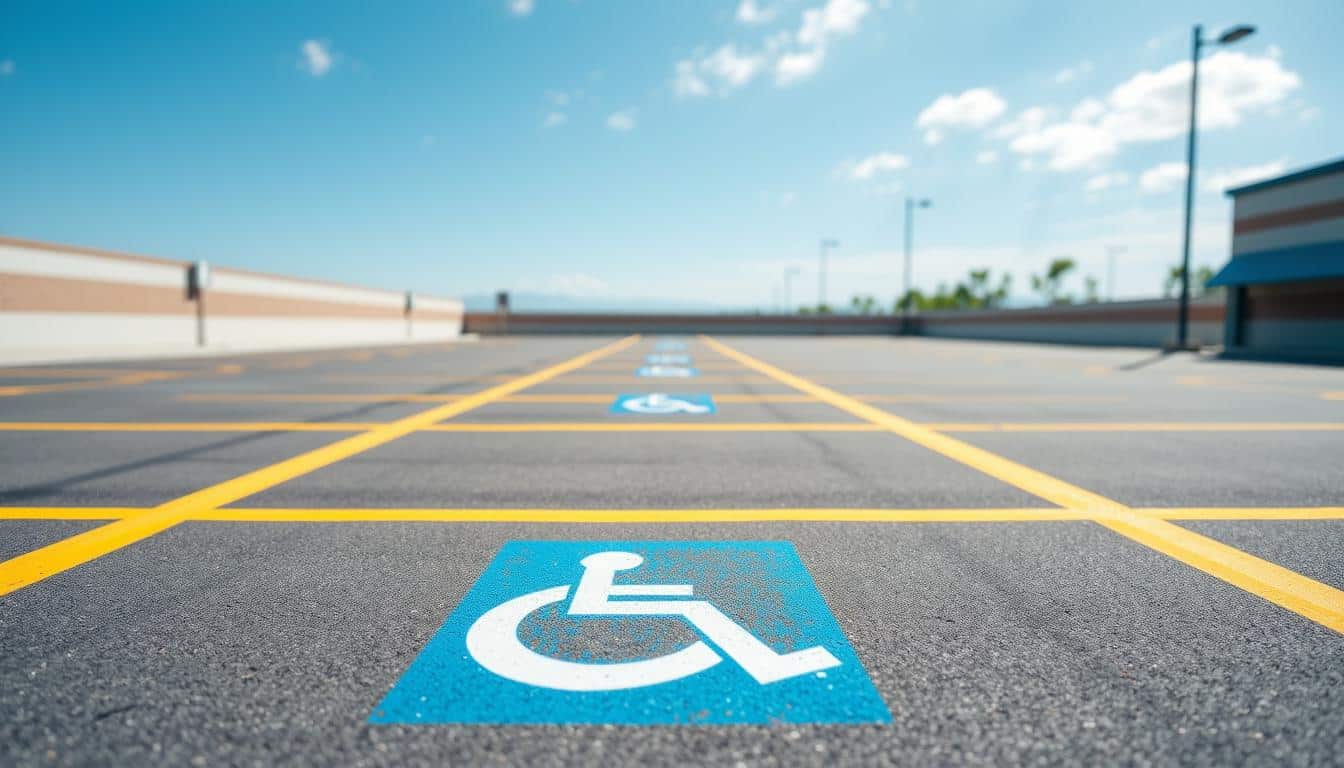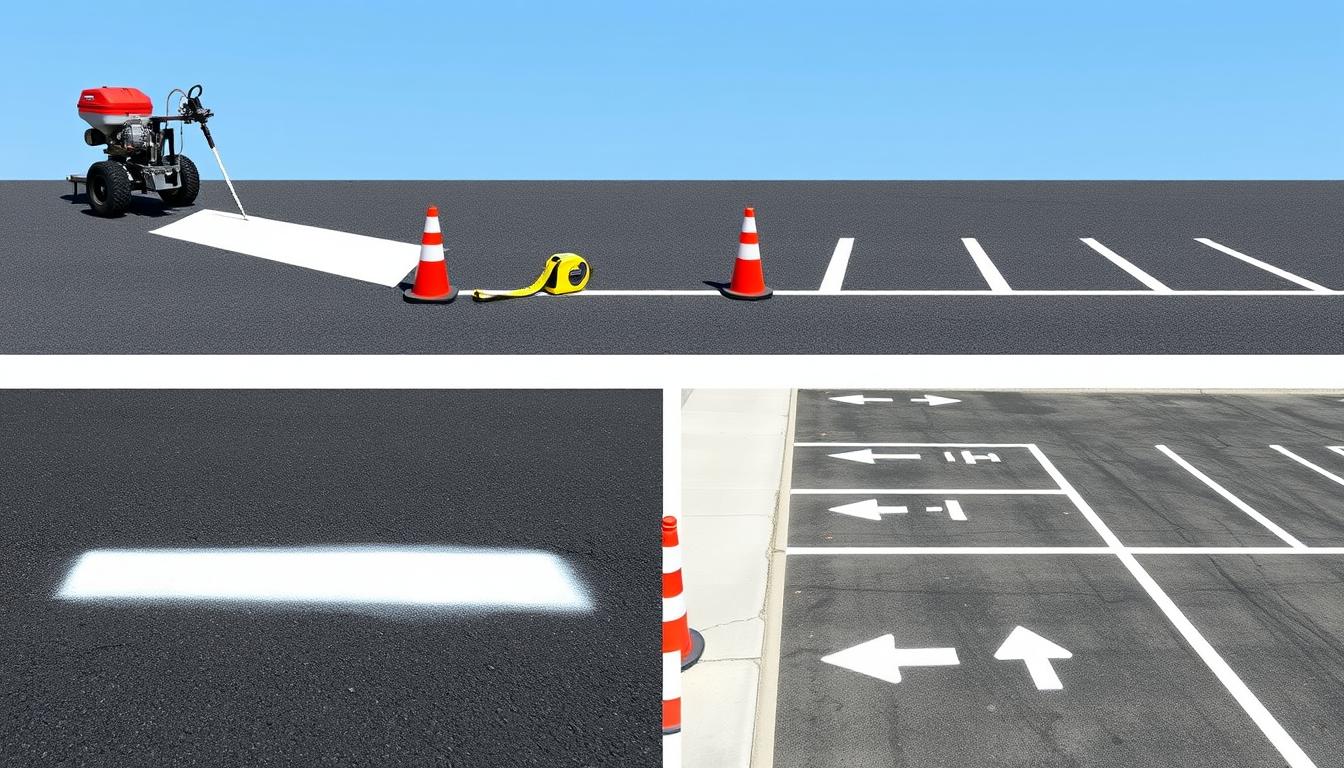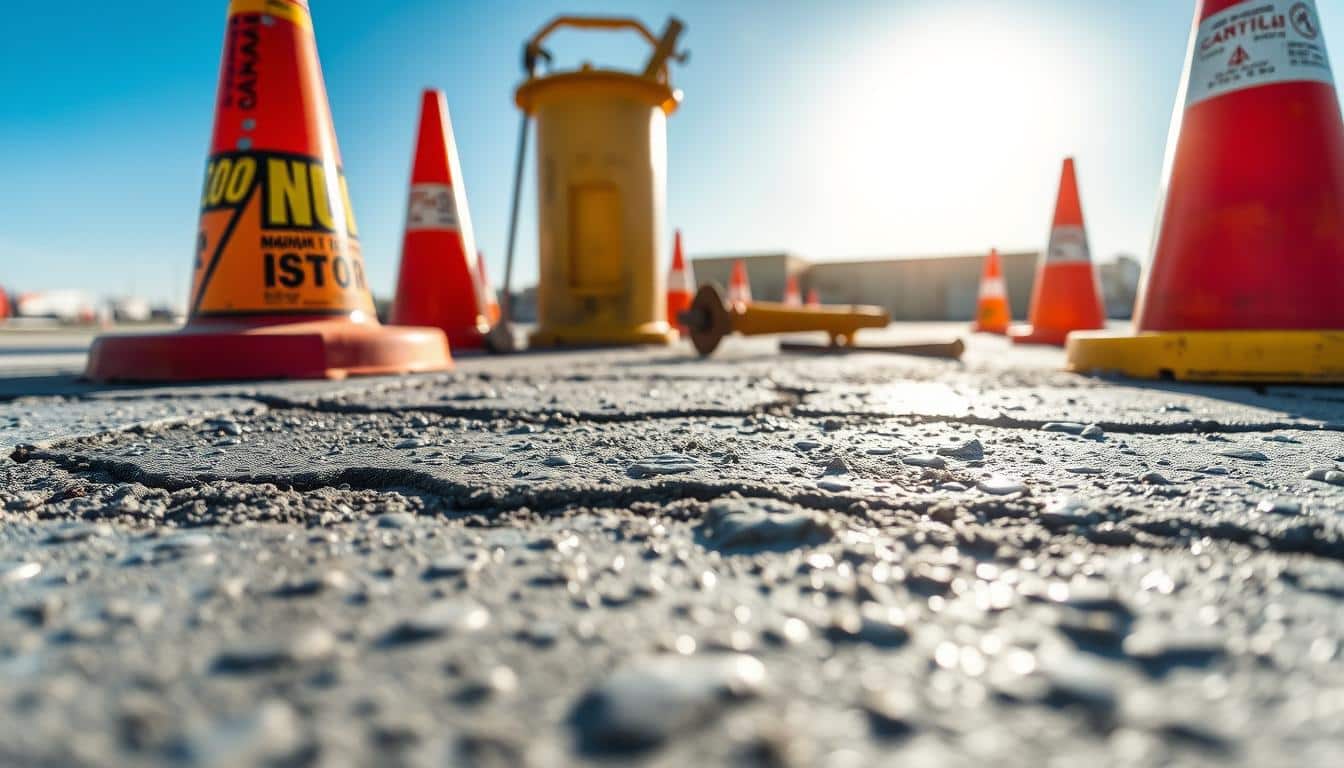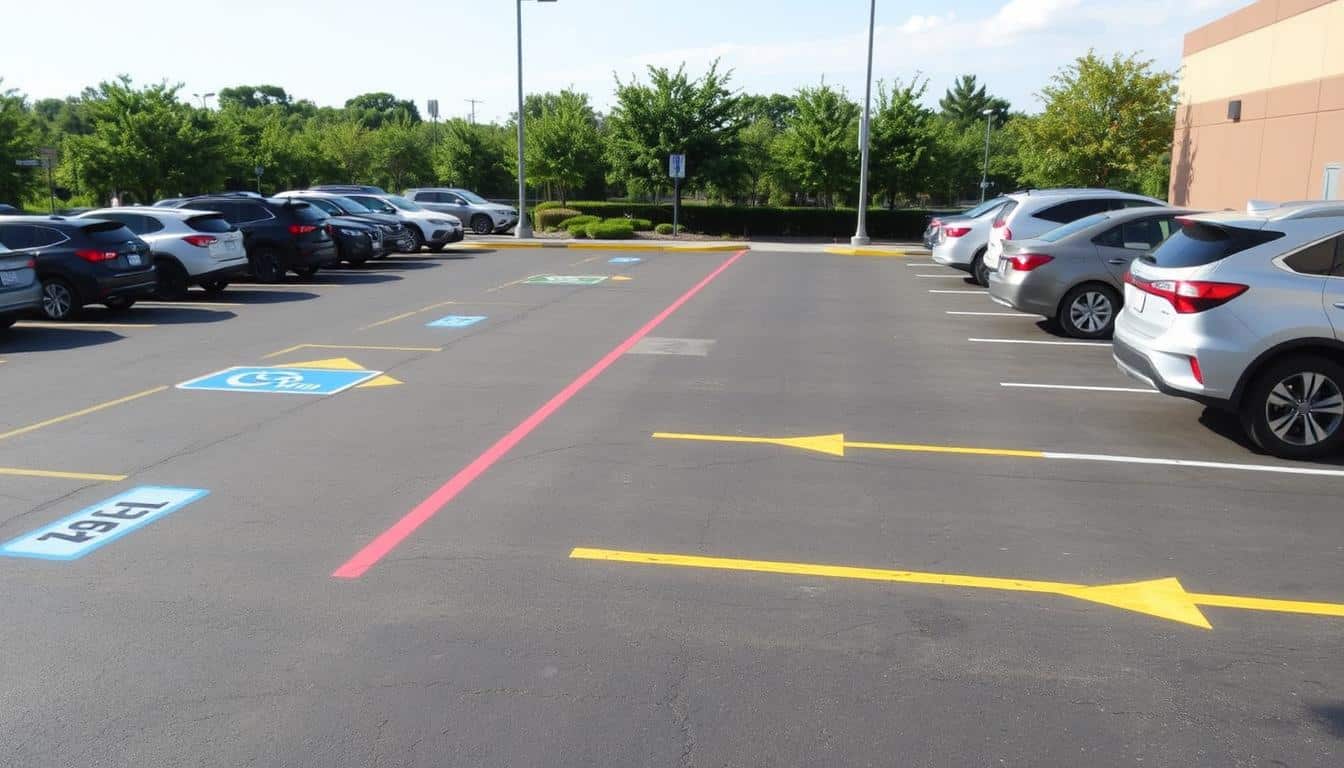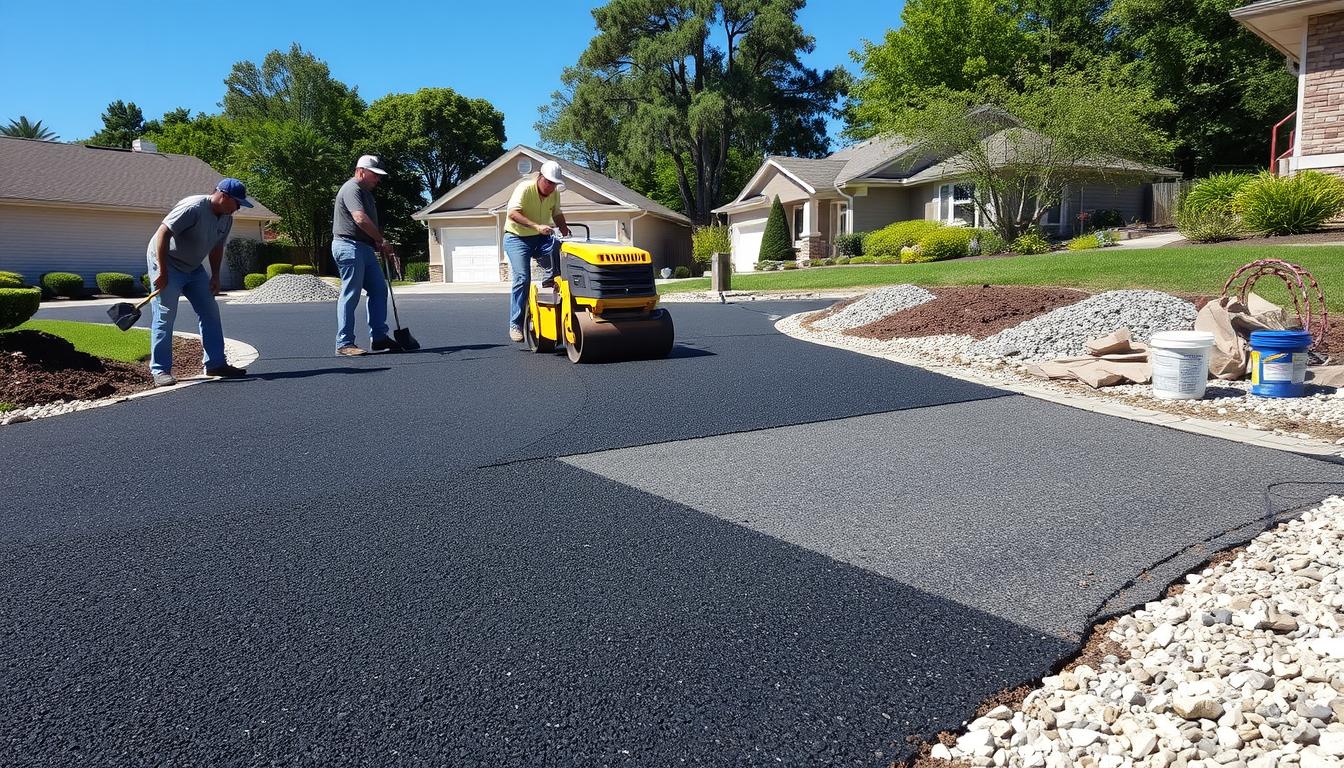What is the Process for Striping a Parking Lot? The secret lies in the process of parking lot striping. This guide will walk you through the steps to stripe a parking lot correctly. It’s all about safety, aesthetics, and legal compliance.
We’ll cover everything from preparation to maintenance. Facility managers and maintenance teams will learn how to improve and beautify parking lots.
Key Takeaways
- The parking lot striping process involves multiple key steps.
- Clear striping can cut accidents by up to 50%.
- Well-marked lots boost customer retention by nearly 60%.
- Professional striping lowers long-term upkeep costs.
- Following ADA rules is key for safety and access.
- Seasonal upkeep keeps paint fresh and extends lot life.
Understanding the Importance of Parking Lot Striping
Parking lot striping is very important. It makes places safer, more organized, and looks better. It also makes sure everything follows the law.
Good parking lot line painting helps drivers a lot. It makes the space work better too.
Safety and Organization
Good striping makes it easier to see and move around. This reduces accidents and confusion. It’s key for keeping everyone safe.
Without clear lines, parking lots can see a 30-40% rise in accidents. Faded lines cause chaos. But, fresh lines keep things in order and improve traffic flow by 25%.
Enhancing Aesthetics
A well-striped parking lot looks great and shows a business is professional. It makes a good first impression. This can make customers think more highly of the business.
A nice parking lot can even increase property value by 10-15%. It shows the business cares about its appearance.
Compliance with Legal Regulations
Striping must follow local and national laws, like the ADA. This law requires at least one accessible space for every 25 regular ones. Following these rules avoids legal trouble and shows respect for everyone.
It’s important to update striping every 1-3 years, more often in busy areas. Keeping lines clear is key for safety and following the law.
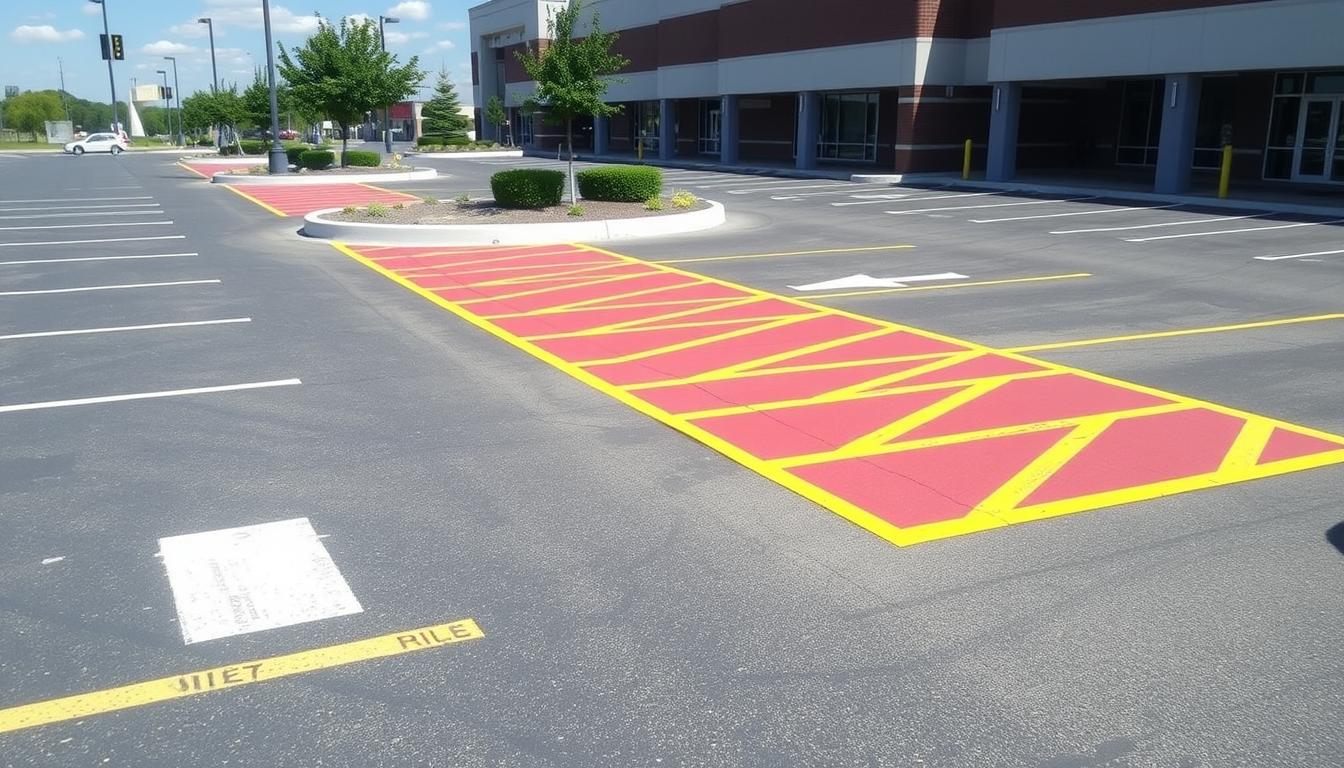
Preparing for the Striping Process
Getting ready for a parking lot striping project is key to success. This step involves two main parts: checking the parking lot’s condition and planning the striping service well.
Evaluating the Parking Lot Condition
Before starting, it’s important to check the parking lot’s condition. Look for cracks, potholes, and wear on the surface. This helps make sure repairs are done right, so the paint sticks well.
Faded or unclear lines can cause problems. They can lead to confusion and mess. So, it’s vital to do a thorough check before starting the striping.
Scheduling the Striping Service
When you schedule the striping, timing is everything. Choose quieter times to avoid disrupting business and causing trouble for customers. A good plan fits the lot’s needs and follows local rules.
Professional line striping can usually be done in a day. This means you can have a marked lot quickly, with little downtime. For more on planning, check out this resource.
Choosing the Right Striping Material
Choosing the right striping materials is key to effective and lasting parking lot markings. Knowing the types of paint and their features helps owners pick the best for their needs.
Types of Paint Used for Parking Lots
There are two main paint types for parking lots: water-based and solvent-based. Water-based paints are eco-friendly and dry fast, usually in 30 minutes to an hour. This quick dry time means spaces can be used again sooner.
On the other hand, solvent-based paints last longer and handle weather better. They’re great for busy or harsh weather areas. Picking the right paint depends on the area’s weather and traffic.
Benefits of Thermoplastic vs. Paint
Thermoplastic materials are more durable and last longer than paint. They might cost more upfront but need less upkeep. This makes them perfect for places with lots of traffic.
Knowing the perks of thermoplastic helps businesses decide based on their budget and how much traffic they get. It’s all about finding the right balance for your parking lot.
Measuring and Marking the Layout
Effective parking lot striping starts with careful measuring. Accurate measurements lead to a safe and efficient space. Key steps include figuring out stall size and planning traffic flow.
Determining the Stall Size
Parking stalls usually are 9 feet wide by 18 feet long. But, compact and oversized vehicles might need different sizes. It’s important to follow these measurements to save space and ensure safety.
Planning for Traffic Flow
Planning traffic flow is key in designing the layout. Clear signs for entrances, exits, and directions help avoid confusion. A well-designed layout makes parking better for everyone.
Cleaning and Prepping the Surface
Preparing a parking lot surface needs careful attention. It’s key to clean the surface well. A clean area helps paint stick better, avoiding chipping and wear.
Importance of Surface Preparation
Cleaning right is essential for striping. It makes sure the surface is clean of dirt and debris. This ensures the paint lasts longer, even in busy areas.
Techniques for Effective Cleaning
There are many ways to clean a parking lot. Power washing, gas blowers, and manual scraping are used. Each method helps create a perfect base for striping. Spending time on cleaning saves money and looks better.
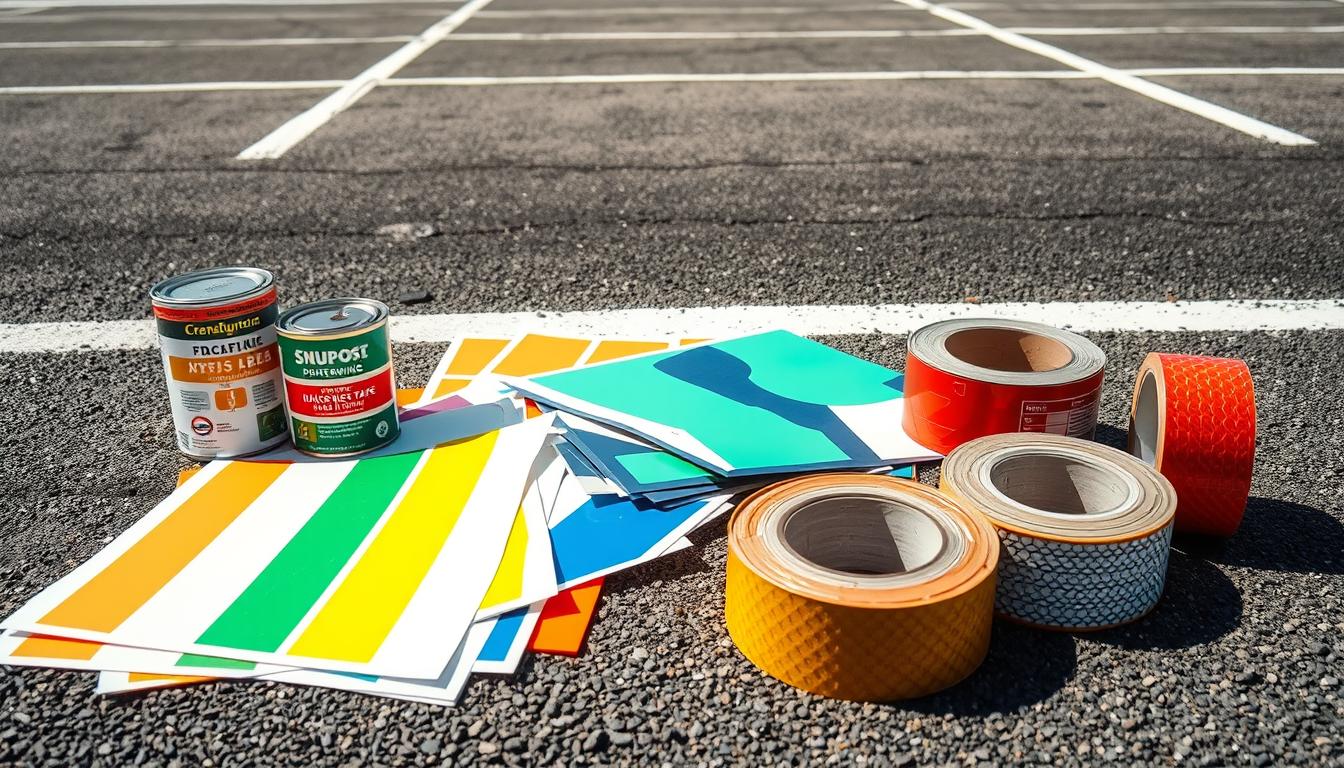
Applying the Parking Lot Striping
When applying parking lot striping, the weather is very important. The best weather ensures the paint sticks and dries well. Avoid rain and extreme heat to make the striping last longer.
On a sunny, dry day, the paint dries fast and sticks well. This means it won’t peel or fade quickly.
Weather Considerations
The weather greatly affects how well the striping turns out. It’s best to do it when it’s not too humid and there’s no rain. This way, the paint dries evenly and sticks to the pavement.
Hot weather makes the paint dry faster, but cold weather slows it down. You need to plan carefully based on your local weather.
Equipment Used in Striping
Using the right equipment is vital for good results. Line striping machines, like the PowrLiner 850, help you apply the striping accurately. They come in different sizes for various projects.
Choosing the right paint is also important. Water-based paints are good for the environment, while solvent-based ones last longer. Adding reflective glass beads to the paint makes it more visible at night, keeping everyone safe.
Allowing for Paint Drying Time
Managing paint drying time is key for a parking lot’s durability and look. Humidity, temperature, and paint type all affect drying time. Solvent-based paints dry faster than water-based ones, so it’s important to know these factors to prevent smudging or incomplete curing.
Factors Affecting Drying
Humidity and temperature are big factors in paint drying speed. High humidity slows drying, while the right temperature speeds it up. The paint type also matters, as some need more time to last against the weather. Knowing these can help in maintaining and improving parking lot striping.
Best Practices for Traffic Control
Good traffic control is essential when paint is drying. Using cones and tape keeps people and cars away from wet paint. This protects the paint and keeps everyone safe. Following these practices helps the parking lot go back to normal use smoothly, with less disruption.
Post-Striping Maintenance Tips
To keep your parking lot looking good and safe, it’s important to follow some maintenance tips. Regular care helps keep the lines clear and ensures safety. It also keeps your lot in line with the rules.
Checking your parking lot often is key. This helps spot any problems early on.
Regular Inspections
Check your parking lot every 3 to 6 months, more often if it’s busy. For places with lots of people, monthly checks are best. This way, you can catch faded lines before they cause trouble.
By fixing these issues early, you can avoid big problems. This can cut down on delays by up to 30%.
Touch-Up Procedures
When lines start to fade or chip, it’s time for touch-ups. Do these every 1 to 2 years to keep things looking sharp. Using the right paint makes lines more visible at night.
Keeping up with maintenance makes your lot look better and safer. It can make lines 50% more visible, according to experts.
Why Choose HT Paving and Seal Coating Services?
Choosing HT Paving means getting the best in parking lot striping. We have a lot of experience in the Bay Area. Our dedication to excellence helps us meet the needs of both homes and businesses in California.
Our Experience in the Bay Area
HT Paving has years of experience in parking lot striping. Our knowledge in the Bay Area lets us use methods that make parking safer and more organized. Proper striping cuts down on accidents and confusion for drivers.
It also makes parking spaces more efficient. You might be able to fit up to 20% more cars than in unmarked lots.
Commitment to Quality and Safety
HT Paving is all about quality and safety in striping. We use paint that lasts 30% longer. This keeps us in line with ADA rules, avoiding fines.
Keeping up with regular upkeep and re-striping is essential. Without it, markings fade quickly. Choosing HT Paving means you’re choosing reliable service and a commitment to quality and safety.
Contact Us for Your Parking Lot Striping Needs
Want to make your parking lot more efficient and safe? Contact HT Paving and Seal Coating Services. We’ll listen to your needs and offer custom solutions. Our team is ready to help you create a well-organized and attractive parking area.
Schedule a Consultation Today
Ready to improve your parking lot? Schedule a consultation with us today. Our team will assess your needs and suggest solutions that follow all rules, including ADA guidelines. We aim to make your lot more functional and increase parking space.
Reach Us at (415) 774-6424
Need help with parking lot striping services? Call us at (415) 774-6424. Our team is ready to help at every step and answer your questions. Choose us to make your parking lot safe, organized, and welcoming for everyone.
